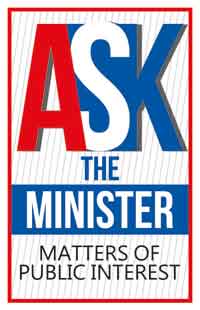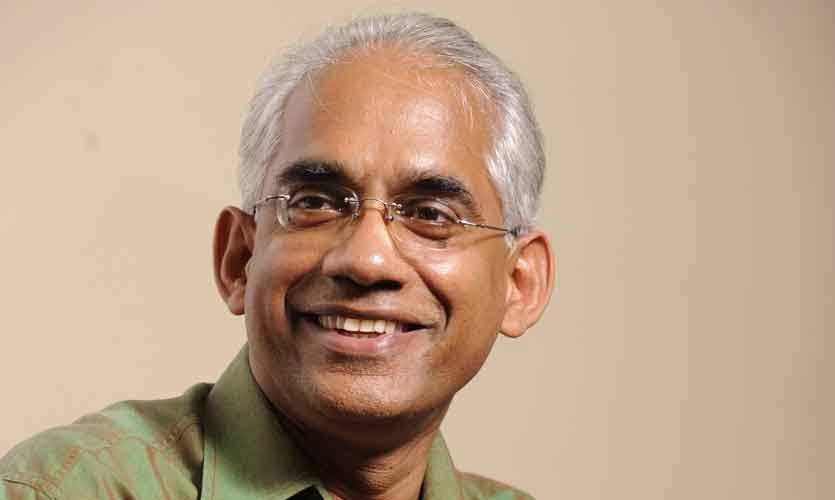Jul 19 2016.
views 1098
Life Online met up with some Ministers and asked them a few questions. Their answers will be carried in this weekly column.
This week...
A chat with Minister Eran Wickramaratne
Deputy Minister of State Enterprise Development

Can you tell me what exactly your role is in the government, as people are a little confused about what exactly you do?
I am the Deputy Minister of Public Enterprise development, a member of the United National Party – General Treasurer and part of the leadership - of the party. I am also a Legislator. As a legislator I focus on Economy, Women & Gender related issues, Good Governance and Management. I am also concerned about reconciliation and cohabitation and building a united Sri Lanka.
There are literally hundreds of state owned enterprises in this country and a large number of them have been allocated to this Ministry. A considerable number of them are huge loss makers and have allegations of corruption and wastage.
Therefore our challenge is to minimise wastage, make it more efficient and reduce the losses which is a burden on the tax payer.
When you say women and gender, what does it mean?
There is a Sectoral Oversight Committeefor Women and Gender issues in parliament and I am one of the male members of that committee. We want to create a more equal society. I’m a strong supporter for having quotas for women to enter the Pradeshiya Sabha, Councils and Parliament itself. That’s one way we can create a more just and equal society.
What area of Public Accounts do you handle?
In Parliament, I serve on the public accounts committee which scrutinises the finance of government department, ministries, and government institutions. That’s the role I play as a legislator.
State enterprises don’t exist only for its employees, it exists for the citizens of this country. We have enterprises ranging from the Airlines, Plantation companies, Hotels, Hospitals and in the Financial sector - the eight state banks including the 3 giants. We are drawing up a framework to improve its management and efficiency and also to insulate the management of these enterprises from political interferences.
How do you plan to fund these Enterprises?
To fund these enterprises, we need management. We are in there with an open mind. For some strategic enterprises we will continue with state ownership. Other enterprises we might go for private partnerships. There are others that may not need to have state ownership. We will look to bring in Equity through Equity partners and good management.
As Sri Lanka is geographically strategically located, are you considering having Trincomalee as a Commercial centre, as some super powers and all the fast developing countries are on that side of the map?
That is correct. We are a teardrop island on the South of India basically on one of the busiest sea routes in the world. Sri Lanka is strategically positioned as an entrepot trading centre. This is not a new idea. In the year 1100 when King Parakrambahu reigned, Sri Lanka was an entrepot trading centre. Historians record that at that time China was the richest country in the world with the highest per capita income.We are aware of the natural habour in Trincomalee and basically developing Trincomalee as a commercial centre. We have had some discussions with the Indians in the past decade and we are hoping that some of that will translate into investment. The Koreans and Japanese have also been interested, we are pursuing those discussions too.
What about trade agreements?
Unlike 25 years ago, the world today trades on investment and trade agreements. Sri Lanka has been a little slow in this area. A country on average would probably have ten such trade agreements but we have only three or four of which only one is of some substance.
We are looking at trading into larger markets. So in this pursuit we have to attract investment. The former government’s mistaken strategy was putting the state at the centre of its economic strategy and a belief that the commanding heights of the economy should be in the hands of the state. From 2009 – 2014 they increased the state owned enterprises by more than 100. They added to the budgetary burden and losses and tax payers had to fund these things.
Our strategy is to have a more open economy basically making the environment to do business better, and get people to invest here.
In this endeavour, what are the countries you are looking at initially?
India is on our doorstep, China in also interested, Japan has been traditionally a friend of Sri Lanka.
The stewardship of the past regime was extremely poor. Fifteen years ago Sri Lanka exported about 32% + of its GDP and today it’s down to less than 15%. We have to reverse that. In that endeavour our relationship with the rest of the world matters. We were cornered by the international community in the past decade. Our government has reversed that position. We have a policy which is ‘Engage with all Entangle with none’.
We have friendly dialog going on with India and China at the same time. We are mindful of the close proximity to India and India’s security concerns. At the same time we are also open to any country which is willing to invest here. Therefore we will have an even handed policy on investment and trade.
We are conscious of the fact that there is sunken investment in Hambantota, in terms of Port and Airport. We will continue to look at attracting more and more investment into Hambantota. It’ll be fairly natural to the Chinese who are familiar with it also to look at investing there.
Why is it that we can’t be a leading economy in Asia like we used to be?
The thing that has held back this country from actually becoming the leading economy in Asia, and that means getting to the top of the ASEAN league table in the last fifty years, has been our inability to resolve some of the basic issues. These revolve around the co-existence of minorities with the majorities. Giving the minorities more space has worked very positively in many countries.
These taxes that have been imposed, it’s a huge burden on the people. What do you have to say about it?
Taxes are a necessary evil. Governments have to provide basic essential services such as armed forces, police and judiciary, and these have to be maintained. The modern day people even want services such as, better health facilities and quality universal education absolutely free. Sri Lanka’s tax rates have been very much lower than in lots of countries.
The controversy is about VAT which is a more progressive tax. 160 countries in the world have VAT. Now that we are emphasising the VAT, in the next few years we must rationalise and begin to eliminate a lot of the other taxes and take their rates away as well. Simplification of the tax system is called for.
When the VAT was introduced this time, some went from 11 – 15%, some from 0 – 15%, which was a steep jump. But the Finance Ministry has exempted 131 goods and over twenty services from the VAT. One sensitive area has been Health. Pharmaceuticals have been exempted and out patients will also be exempted and that will include things like Dialysis that takes the pressure off to some extent.
Sri Lanka has the lowest revenues 11- 12% of the GDP, when it should be more like 20%. So revenues have to be collected to maintain good and efficient public services.
Did you know?
- Eran was the Head Prefect of Royal College, Colombo and also represented the school in cricket.
- He gained a BSc in Economics and Politics and a MSc in Economics from the University of London.
- He was the Vice President of Citibank in 1982
- He was CEO of NDB Bank in 2001
- He was the Founder Chairman of the ICTA
6 Comments
Mahinda says:
Jul 19, 2016 at 02:24 pmA top professional turned politician. One of the few honest politicians we have in the country today. More should follow his footsteps. Wish him well in his future en-devours to reshape SL to the true glory it can be.
Ananda Munasinghe says:
Jul 19, 2016 at 09:03 pmI want to ask hon; minister about Sampur coal power plant.In media,it has been exposed that project is being pushed for by handful of engineers at CEB & they have been able to mislead the politicians .Isn't the government's responsibility to intervene to stop this project ?
Dr A H A Hazari says:
Jul 19, 2016 at 09:37 pmGreat & honest politician whom all should follow ✌
ANTON says:
Jul 20, 2016 at 07:35 amONE DAY, THIS HONEST, EDUCATED GENTLEMAN WILL BECOME THE LEADER OF THIS COUNTRY,
Priyanthi says:
Jul 30, 2016 at 11:33 pmAnton, Eran can never become the leader of this land as you have posted. He is not cut out for this job. Good banker only with due respect. He is no where near the calibre of the great leaders like DS Senanayake, Dudley Senanayake, Gamini Dissanayake, Sir John Kotelawala, Ranasinghe Premadasa or even Ranil Wickremasinghe. Its a dream and your dream.
Prashan says:
Jul 30, 2016 at 11:23 pmEran is a good man like many other good men. I hope he will not compromise on his position for political gain which is very common amongst politicians. He has not been shown him self to be a strong leader and not heard him speaking out on crucial matters pertaining to the country which is not a way forward for a leader. Long way to go i think. Hope he can survive with this lot.